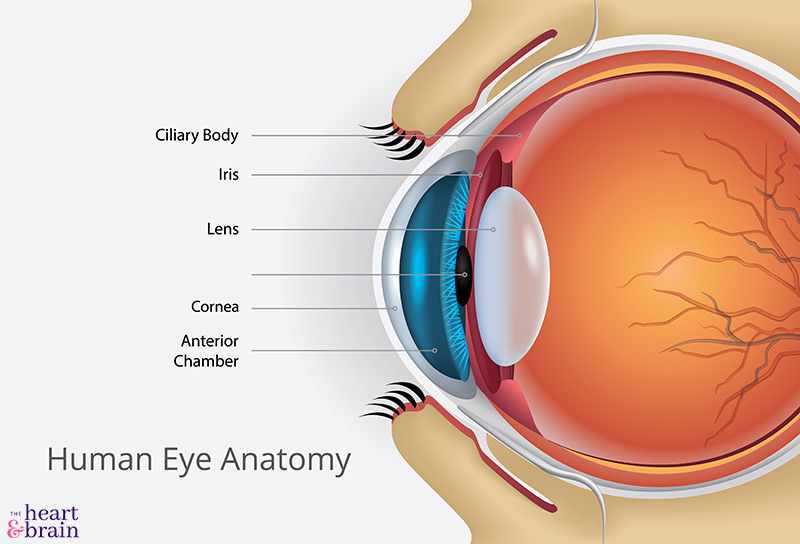You’re suddenly seeing your nose in your vision for multiple reasons, such as focusing too much knowingly, anxiety-driven focus, or other medical conditions. Medical conditions that could worsen your vision include developing tunnel vision from migraine, retinitis pigmentosa, glaucoma, diabetic retinopathy, or stroke. You can use some prevention techniques to preserve your vision from degrading. Visiting a health care professional or an eye doctor is the best decision to clear out your doubts about your eye vision.
Our eyes and field of vision are such that we see almost everything around us. With the help of our peripheral vision, we can see things that are not directly in our line of sight.
When it comes to our nose, we can’t usually see it in our line of vision, and our brain chooses to ignore it even though it’s a prominent feature on our face and just below our eyes.
But if something weird has started happening with you recently and you’ve started to notice your nose in vision more often than you would like to, there might be a couple of reasons behind such a focus on your nose.
Usually, we tend to ignore our noses, but if it’s in your focus constantly, that can disrupt everything you do.
Understanding the human vision
Before we start analyzing why we can suddenly see our noses, it’s vital to know and understand the human vision to comprehend its work fully.
The human eye has different parts to it, with all of them working together to form an image and help us see.

The main components of our eye include the cornea, lens, retina, and optic nerve.
- The cornea is the transparent front surface responsible for letting light into the eye and focusing it.
- The lens then adjusts this focus directing the light onto the retina.
- The retina, a light-sensitive tissue lining the back of the eye, receives the focused light and converts it into electrical signals.
- Finally, these signals are sent to the brain via the optic nerve, which processes the information to create the images we perceive.
While our eyes are placed in such a way on our face that from time to time, we will see our nose, either partially or even fully, that doesn’t mean something is wrong with us.
However, our brain usually filters out the images of our noses and doesn’t focus on them too much to help us see our surroundings more clearly.
Reasons why you suddenly see your nose
If you suddenly start seeing your nose in vision all of the time and it isn’t going away back to normal, then it might be due to some reasons mentioned below.
1. Field of vision
Your nose blocks parts of your visual field, but if you look left and right, you might be able to start seeing your nose suddenly.
From the information received from both eyes, it constructs a whole normal image. It makes you freak out over why you can suddenly see your nose, but this is normal.
Our brain, on purpose, makes the nose go unnoticeable, and this phenomenon is known as selective attention.
This phenomenon helps us focus on specific aspects of our environment while ignoring other unimportant things.

Sensory adaptation is another important mechanism that helps us not focus on our noses too much.
It allows us to adjust to constant stimulations, such as the constant vision of our nose, and instead helps us prioritize our surroundings more.
It’s very close to your eyes, so it’s out of focus while your eyes are focused on things around you. But if you suddenly start looking down, all you’ll notice is your nose.
If you close one eye and see with the other, you can see one side of your nose, which also happens with the other eye.
Selective attention and habituation
Selective attention is a cognitive process that allows us to focus on specific stimuli while ignoring others.
So it allows us to focus more on our surrounding environment while ignoring irrelevant details such as images of the nose.
This ability, in turn, helps our brain to filter information and avoid an overload of sensory input by avoiding what’s unimportant.
Habituation is a psychological phenomenon where our response to a stimulus decreases over time due to repeated exposure.
This happens all the time with our nose, as we can see its partial image all the time, but our brain gradually becomes used to its presence and stops responding to it as much.
With the help of selective attention and habituation, we can focus on more important things around us and avoid an overload of sensory images.
2. Anxiety

We all have a nose in vision, which we sometimes notice when we focus on.
But when you suddenly start seeing too much of it, it could also mean you’re hyper-focused on it.
People suffering from anxiety usually have this issue.
If you start focussing on this normal image of your nose, that’s all you’ll see.
You’re consciously looking at it, and you know it’s there, so that’s what your brain will always transmit to you.
When you have anxiety, you’re hyper-focusing on things, and if your nose is something you’re focused on, that’s all you’re going to think about.
The best thing to do here is to distract yourself and focus on other things around you.
Indulge yourself in some activities, hobbies, or work, and slowly you’ll lose focus on your nose.
3. Tunnel vision
Another possibility of why suddenly you’re so focused on your nose, and you can’t stop seeing your nose could be some problem with your vision.
Tunnel vision, popularly known as peripheral vision loss (PVL), is where the person with this condition starts losing their peripheral vision.
In this condition, the sole focus remains on what’s in the front.
Due to some medical condition, the affected person can’t clearly see what’s in front of them, which might be why your focus is limited to your nose.
Some of the medical conditions which lead to such disturbance in the vision are:
Migraine

Migraine can cause visual disturbances if lasting longer than 60 minutes recently.
You might need medical help immediately if your vision is focusing on your nose too.
Retinitis pigmentosa (RP)
Retinitis pigmentosa is a condition that affects the retina and is genetic.
It affects vision by altering the retina’s response to light, making it difficult to see.
It’s more of a gradual loss accompanied by other symptoms like loss of night vision, color vision, and gradual central vision.
Glaucoma
Under this condition of glaucoma, vision loss is due to damage caused to the optic nerve.
The optic nerve is responsible for sending signals to the brain so the right image is produced of whatever a person sees in front of them.
In this condition, a person slowly loses their peripheral vision. So there might be a fixation of something like your nose.
Diabetic retinopathy
It affects people who have diabetes. People with too much sugar in their blood can damage their retinas.
Slow vision loss is witnessed among people suffering from this condition.
Their distant vision is affected, so their vision becomes focused on things close enough to them, such as their nose.
Stroke
People who have a stroke have difficulty seeing both or one eye. So people suffering from a stroke lose an area of vision.
If you lose sight in one eye, you can clearly see your nose with vision in one eye.
How can I prevent constantly seeing my nose?
There might be a possibility that your vision is focused too much on your nose.
It’s also because you might be experiencing vision impairment in some form or the other.
From the above possible causes, we can see those possible symptoms accompanying you if you begin to suffer from a medical condition.
If lately your symptoms and vision are worsening and you notice the effects lasting more than 60 minutes, seeing your nose in the vision for more than an hour at a time, then you need to be careful of possible worsening of your situation:
- Sudden numbness or weakness in the arm, leg, or face
- Sudden confusion
- Difficulty walking or loss of balance
- Sudden or severe headache
The best decision is to visit an ophthalmologist (eye doctor) and get a detailed eye exam done.
Your doctor will probably test you and give you eye drops to soothe your eyes initially.
If you have a medical condition, it’s the best time to get the proper diagnosis, get some much-needed health tips, and start getting your eyes treated.
Some of the things you can do to help maintain a healthy vision are:
- Maintaining a healthy diet
- Avoid smoking
- Wear screen-protected lenses in specs
- Know about your family history
- Maintain blood sugar levels
- Clear out any eye makeup before sleeping
FAQs
Why do I see two noses in my vision?
Sometimes when our vision is misaligned, then we might see two noses.
If we focus our vision specifically, we can easily see two images of our noses. Both our eyes see the same thing separately, making it appear like two noses.
Why can’t I look at my nose with both eyes?
When we usually look, the nose given by one eye merges with the image of a different object in the image by the other eye, which is generally brighter than our nose.
The same takes place with the other eye. We can’t see our nose because it’s too dark compared to brighter scenes around the nose.
How can you tell if your eyes are out of alignment?
Various symptoms can tell us about the misalignment of our eyes:
– Eyes not moving together
– Frequent blinking or squinting
– Tilting to one side to see things
– Faulty depth reception
– Double vision
Can anxiety cause vision issues?
When a person suffers from anxiety or stress, their body produces high adrenaline, which causes pressure on the eyes.
It results in blurred vision. But anxiety can also cause one to hyper-focus on things such as their nose and cause tension about how they see their nose in their sight.
Can optical illusions help us understand why we see our noses?
Optical illusions or more correctly known as visual illusions, widen the mental horizon and make it clear that things are a little different than they seem.
They help us understand how visual processing works in the normal brain.
How does visual attention affect our awareness of our nose?
Visual attention helps us know which elements of our surroundings we consciously perceive.
When we focus on our nose, the brain thinks of it as important and makes it more noticeable.
But when our attention is somewhere else, then the brain filters out unimportant information, such as our nose, which is always partially visible to us.
What role does the blind spot play in our perception of the nose?
The blind spot is an area where the optic nerve exits the eye, leaving it insensitivity to light.
The blind spot in each eye complement each other and allows the brain to fill in the missing information. This helps the brain’s ability to filter out the nose from constant perception.
References
- https://www.pacificneuroscienceinstitute.org/blog/nose-sinus/is-your-nose-bent-out-of-shape-maybe-its-a-deviated-nasal-septum/
- https://www.ncbi.nlm.nih.gov/pmc/articles/PMC5972137/
- https://www.medhelp.org/posts/Eye-Care/Eye-damage-Seeing-my-nose-in-vision/show/2530298
- https://www.ceenta.com/news-blog/why-cant-i-see-my-nose
- https://www.redonline.co.uk/wellbeing/a528103/13-physical-symptoms-you-didnt-know-were-caused-by-anxiety/
- https://blog.uvahealth.com/2018/07/26/vision-changes-that-could-signal-a-serious-condition/


